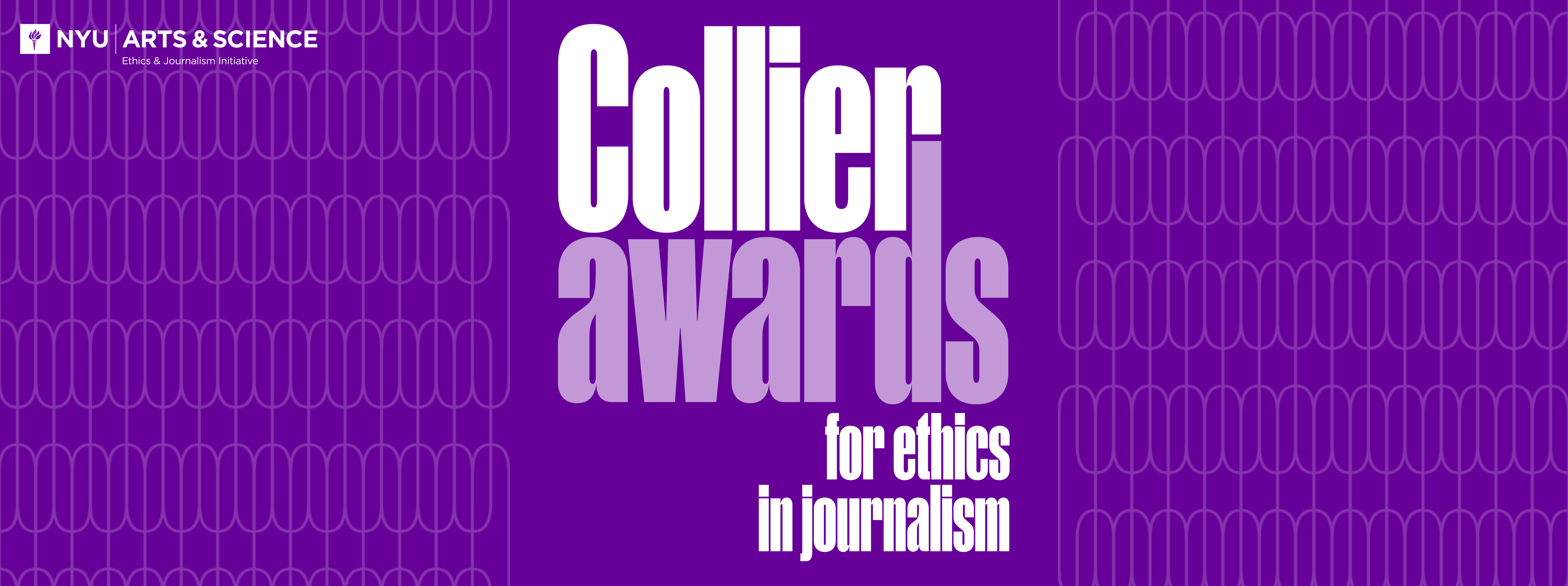We are honored to recognize these extraordinary journalists and grateful for the opportunity to celebrate with them in New York City this week.
The Peter F. Collier Award for Ethics in Journalism celebrates acts of journalism by student and professional journalists that meet the highest ethical standards in the face of pressure or incentives to do otherwise. The award is administered by the Ethics & Journalism Initiative at the Arthur L. Carter Journalism Institute at New York University.
First Prize
Student Category: Garrett Shanley; “‘Oath of Fealty’: How the U. of Florida Forced Faculty Cooperation with a GOP-backed Civics Center”
Read here: https://www.chronicle.com/article/oath-of-fealty
For using sophisticated reporting techniques to protect confidential sources in an unflinching account of a high-stakes, politically charged showdown between faculty members and university administrators at the University of Florida
Four faculty members from the University of Florida talked to UF student Garrett Shanley about a high-stakes battle between faculty members and university officials over a new institute established on campus at the behest of Florida Republicans with ties to Governor Ron DeSantis. Given the perceived risks, only two of Shanley’s sources agreed to be identified by name in his story, which ran in The Chronicle of Higher Education. Shanley employed sophisticated strategies to protect the identity of his confidential sources, including the use of Florida’s freedom-of-information law to obtain a crucial email.
Local Category: Adam Ganucheau, Anna Wolfe; Mississippi Today; Continued coverage of state officials’ alleged misuse of federal welfare funds
Read here: https://mississippitoday.org/mississippi-welfare/
For covering fallout from its prize-winning expose of Mississippi’s $77 million welfare scandal, despite an ongoing lawsuit against Mississippi Today by a powerful ex-governor
More than a year after Mississippi Today published a Pulitzer Prize-winning expose about the misappropriation of $77 million in federal welfare grants, former Mississippi governor Phil Bryant sued the nonprofit newsroom for defamation, citing comments made by Mississippi Today’s publisher and journalists after the Pulitzer announcement. Bryant’s lawsuit threatened to compromise the confidentiality of a Mississippi Today source who leaked the former governor’s text messages about the welfare funds – and put at risk the financial viability of the newsroom. Mississippi Today nevertheless continued to protect its sources and cover fallout from the welfare scandal, while maintaining its commitment to seeking fair comment from Bryant.
National/International Category: Jessica Contrera, Jenn Abelson, John D. Harden, Carolyn Van Houten, Hayden Godfrey, Nate Jones, Lynda Robinson; The Washington Post; Abused By The Badge
For protecting the most vulnerable of sources in a powerful investigation of 1,800 criminal cases against law enforcement officials charged with sexually abusing children
Washington Post journalists spent two years analyzing data and examining court records to produce the Post’s multipart series, but the heart of the project is searing accounts from the children who survived these crimes – the most vulnerable of sources. At every step of the reporting process, reporters Jessica Contrera and Jenn Abelson and photographer Carolyn Van Houten, while amassing ample on-the-record evidence, took extraordinary care to protect the privacy and dignity of these young survivors and their families. The journalists empowered these sources to make fully informed decisions about how much of their identity to reveal and assured that survivors and their families were prepared for their stories to be told publicly. The Post’s series was a model of transparency; it featured a story detailing responses it received from the hundreds of law enforcement officers and agencies it named, as well as an additional piece explaining to readers how Post journalists approached the ethical challenge of reporting on children who survived sex crimes.
Second Prize
Student Category: Ariane Lüthi; “‘They Promised to Take Out Our Families’: The Afghans America Left Behind”
Read here: https://foreignpolicy.com/2024/08/15/afghanistan-allies-american-visas-siv-petitions/
For sensitivity in working with an Afghan war pilot who, despite the risk of Taliban retaliation, decided to forego confidentiality in a Foreign Policy story describing the plight of his family members marooned in Afghanistan
The lead source in Ariane Luthi’s powerful story about the United States’ failure to protect allies stranded in Afghanistan after the U.S. military withdrawal is an Afghan pilot who was on a mission to Uzbekistan when American soldiers pulled out of Kabul. He made it to the United States but his family, whom he last saw in 2021, remains stuck in Afghanistan despite American assurances that Afghan allies would receive expedited consideration for refugee visas. Luthi, a recent Columbia University alumnus, was aware that the pilot’s family could face retaliation from the Taliban if she told his story. The U.S. State Department also advised her not to use her sources’ real names. Luthi offered anonymity to the pilot, outlining the risk of speaking publicly, but he insisted on using his real name and identifiable details. Luthi decided the ethical course was to defer to her source’s fully informed choice.
Local Category: Jessica Calefati, Justin Fenton, Julie Scharper; The Baltimore Banner; “This megachurch warned of hell. Then it concealed its own sins.”
Read here: https://www.thebaltimorebanner.com/specials/greater-grace/
For winning the trust of sexual assault survivors who were raised to believe that criticizing church leaders was a sin that would lead to divine punishment
The Baltimore Banner’s four-part series exposed decades of alleged sexual abuse and cover-up by officials of Greater Grace World Outreach Church, an international evangelical megachurch headquartered in Baltimore. The Banner’s coverage focused on a group of survivors who had been raised in the church but quit the congregation and began investigating sex abuse by church officials. Members of the survivors’ group were initially reluctant to speak on the record, but the Banner spent months building trust by allowing survivors to set the pace and tone of interviews and assuring that sources who agreed to be identified were aware of the potential consequences. Before publishing, Banner journalists traveled to Maine and Virginia to confront church leaders in person.
National/International Category: Madeleine Baran, Samara Freemark, Parker Yesko, and the In the Dark Team; The New Yorker; In The Dark Season 3
Read here: https://www.newyorker.com/season-3
For reporting with humanity, care, and dignity on Iraqi victims of a U.S. war crime
Nearly 20 years after a small group of U.S. Marines killed 24 civilians in the Iraqi town of Haditha, The New Yorker worked closely with Iraqi survivors to uncover the truth about the notorious shooting, for which no U.S. soldier served prison time. The magazine’s nine-part podcast not only presented conflicting accounts of the massacre from Iraqi witnesses and the U.S. military but set out to determine whose version was backed by evidence. Additionally, after The New Yorker, with support from survivors in Haditha, sued the U.S. government to obtain more than 100 secret photographs that proved the shooting was a war crime, journalists handled the grisly images with sensitivity: They recognized that survivors had a right to see the unnerving photographs – but only to the extent each survivor chose to revisit the traumatic day through the newly uncovered evidence. New Yorker journalists followed a similar procedure when sharing other new information with survivors, including direct accounts from Marines, and assumed a high degree of care when deciding what to ultimately publish. While New Yorker journalists believed that publishing photos would back their contention that soldiers killed unarmed women and children, they did not want to violate victims’ privacy. In the end, the magazine published only 10 photographs – and only after obtaining permission from victims’ families.
Third Prize
Student Category: Cathy Wang, An investigation into Johns Hopkins’ controversial real estate holdings
For emphasizing the voices of residents affected by real estate development projects spearheaded by Johns Hopkins University
Johns Hopkins University and its real estate development partners have dominated official accounts of the school’s expanding footprint in Baltimore. Cathy Wang, an editor for The Johns Hopkins News-Letter, sought out community activists, union leaders, and local residents to assess the impact of the university’s ongoing expansion on communities where Johns Hopkins had bought up properties. Wang’s article highlighted these community voices to support data-based evidence that Johns Hopkins had failed to live up to promises it made to residents of neighborhoods touched by its development projects.
Local Category: Rong Xiaoqing, Max Siegelbaum, Clarissa Leon; Documented; “Fear Across Borders: Chinese Americans and the Shadow of Surveillance”
Read here: https://documentedny.com/2024/03/13/chinese-americans-surveillance/
For insightful reporting on the pall cast on New York’s Chinese-American community by increased surveillance from both the U.S. and Chinese governments without taking sides on political divides within the community
Documented reporter Rong Qiaoqing chronicled the fear and suspicion that have taken root in New York’s Chinese-American community as deteriorating relations between the United States and China have prompted both governments to step up surveillance of Chinese migrants. Qiaoqing’s own reporting was affected by the threat of Chinese government surveillance of WeChat, the most popular communications app among her sources. Documented consulted with a security expert to protect its reporter and made sure sources knew of the risk of talking with her. To avoid false equivalencies, Documented declined to take sides on the divide within the community between those who support the Chinese government and those who oppose it, instead focusing on the impact that increased surveillance has had over the entire community, from one end of the political spectrum to the other.
National/International Category: Pramod Acharya, Andrew W. Lehren, Michael Hudson, Anna Schecter, Hoda Osman; NBC News, The Guardian, International Consortium of Investigative Journalists, Arab Reporters for Investigative Journalism; “‘Kill Us or Send Us Home’: Amazon workers in Saudi Arabia say they were exploited by labor supply and recruiting firms”
For reporting on the exploitation of hundreds of Amazon workers in a manner that maintained the confidentiality of sources while also affording the company a robust opportunity to respond
Through interviews with dozens of current and former Amazon workers in Saudi Arabia, this international consortium of journalists exposed illegal recruiting fees, squalid living conditions, and potential labor trafficking by Nepalese agencies with contracts to supply Amazon with employees in the Gulf region. NBC, The Guardian, and their partners carefully balanced the confidentiality of vulnerable workers against the journalism imperative to confirm sources’ accounts with documents, photographs, and, at a relatively early stage of their reporting, Amazon itself. Amazon eventually agreed to pay nearly $2 million in reparations to about 700 workers.


